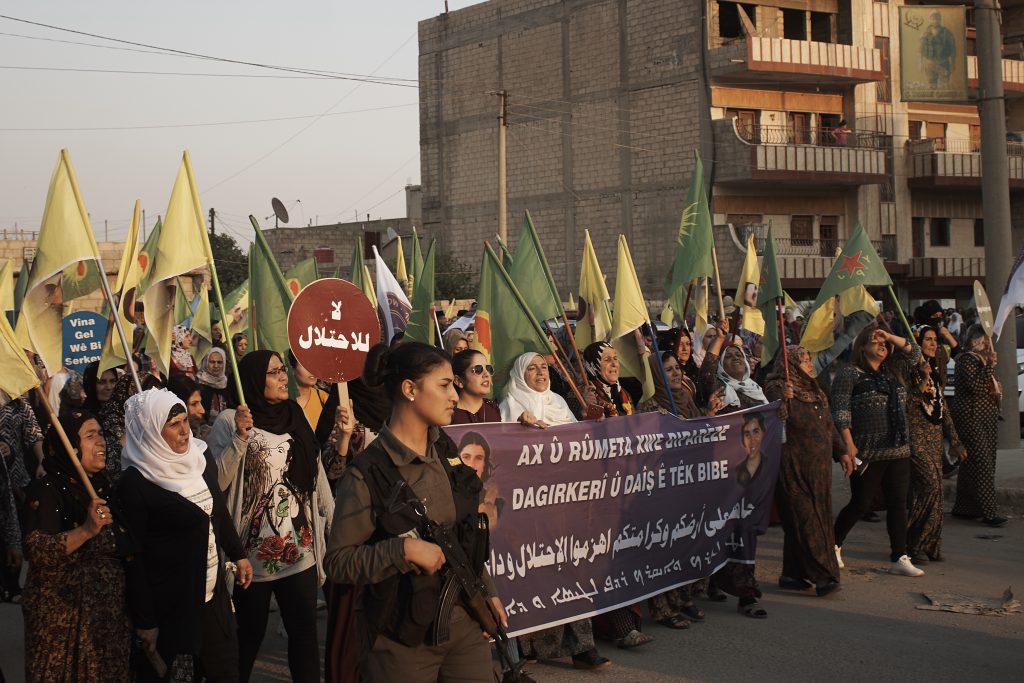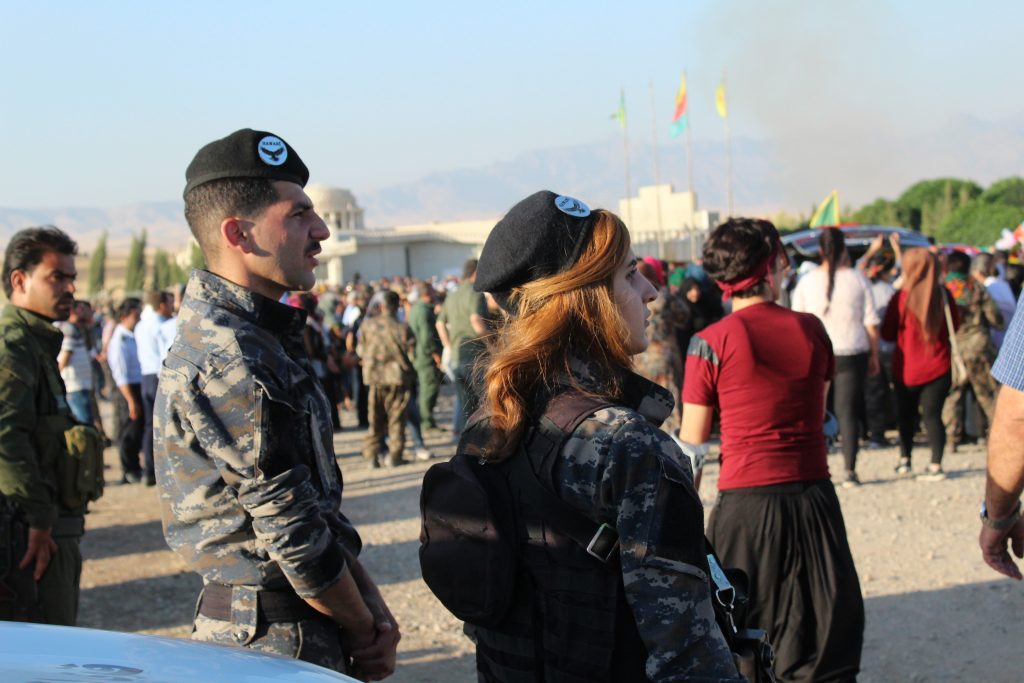A few days ago, several members of the Internationalist Commune of Rojava went to visit the offices of the Asayîş in the city of Dêrik, in the North-East of the region.
Heval Ronahî tells us about it, in his own words:
“When we arrived there, we were welcomed by all the members of the base. They invited us to have çay (tea) while we talked about everyday issues. In the rêveberî (administration), we met with a group of women from Asayîşa Jin and those responsible for the city. Once we finished the çay we started sharing our questions.
Asayîş is an independent military structure that was born in 2012 to meet the security needs of the population after the declaration of self-government in Rojava. Initially there was only one general Asayîş, where men and women worked together, but in 2014, women created their own independent structure to deal alone with all the crimes committed against women. This is also a tool for women’s empowerment as they are now responsible for their own security and suffer no oppression by men.
The small-scale structure is partly horizontal. All departments have their tekmil (evaluation), where they make a report of all the works and actions they have carried out, expose their evaluation and the criticisms and self-criticisms about them. These are then transferred to the rêveberî through meetings held with the spokespersons of all departments and management. On a larger scale the structure is more hierarchical, all the local rêveberîs give their tekmil to the central rêveberî, but it is always this one that takes the decisions in last instance. To enter Asayîş, it is necessary to be between 18 and 47 years old and to not have any criminal record registered by this structure before.
Another question that was asked was what happened to those men who leave the Autonomous Administration of North and East Syria (NES) to marry more than one woman and then intend to enter Asayîş, since polygamy has been banned in these territories. In this case, the man would have to cancel his marriages if he wants to access this structure, otherwise he would not be able to enter.
We also asked about corruption and abuses of authority (which are so common in Western security structures), and whether there was a department in charge of investigating them. The answer was that the people who decide to join the forces Asayîş do so to defend the people, but that sometimes these situations did occur, and so there is an anti-corruption brigade to deal with them.

Asayîş is not present in all villages, especially the smallest ones. In these places, it is the inhabitants themselves who organize in order to defend themselves against crime and solve their problems, with local self-defense groups linked to the people’s communes, under the name of HPC (Hêzên Parastina Cewherî – Social Defense Forces). This does not mean that they would come if they are needed for major reasons. It is an independent structure. This implies that, even when the circumstances call for it, they do not necessarily coordinate with other structures such as YPJ and YPG. The rêveberî explains that since self-government was decreed in the area, crime rates have dropped, and they expect that someday they will not be necessary.
Another function that they have is to control of the “Checkpoints” that are present throughout the territory. A curious anecdote is that when we hitch-hike to move around they are always willing to help you and look for cars that go in your direction or that can drop you further on your way and the truth is that the first time I did this I was impressed by their degree of closeness.
When we finished with the questions, we made a short break during which we talked about politics and the different perspectives we have about revolution and capitalist modernity in Europe. Then we went to visit the different departments throughout the city of Dêrik.
The first one was the department that fights against organized crime. This department fights especially against the drug cartels that are usually subordinated to the Syrian and Turkish governments. Most of the drugs that enter the NES come from these two states and the work they do in this department is basically to monitor and gather information. They also fight against gangs of thieves and terrorist organizations (especially ISIS and other djihadist groups) in order to prevent new attacks and to put an end to these organizations.
The second department we went to visit is the one of the Hawarî, which we could call a rapid intervention and emergency unit. If there is an accident, a quarrel between families or floods, for example, they are the first to respond, often in coordination with other structures or departments.

Then we went to see the intelligence department of the Asayîş, which are responsible for observing people they are chasing, gathering information and investigating suspicious people who arrive. They also often collaborate with the organized crime department for follow-ups and undercover work inside of these mafias. Their work is more at the local level, not like the idea of intelligence that we have in the West.
Finally we went to visit the offices of the Polîs Traffîk (traffic police). Here they told us about the different projects they had in hand, such as awareness campaigns about the use of mobile phones while driving and the use of seat belts. They are also working on a new road safety education system, as well as a re-education system for repeated offenders. They also told us that they give fines to drivers who do not respect the rules and that they can even withdraw their licenses if they do it several times. A parking system was also mentioned. All these measures seek to improve the situation, since the main cause of death is traffic accidents.
My conclusion about the Asayîş is that they are like the NES police, although the difference that I find with the police that we know is that they are truly at the service of the people and do not serve the interests of big business or rich and powerful people. They are also people who know and share the values of democratic confederalism, and who, moreover, are able to give their lives to defend the people and their land by risking falling Şehîd (Martyr) in this task, and this is something we don’t have in the West, where most police have conservative and fascist ideologies. But the main difference is that the police of the capitalist states are a monopoly force of violence, while the Asayîs forces seek to be a defensive force in coordination with the local forces linked to the People’s Communes (HPC). Thus we see the confederal influence that seeks to decentralize the state monopolies, especially the monopoly of force, creating alternatives.”
[gallery_bank source_type=”gallery” id=”59″ layout_type=”slideshow_layout” alignment=”left” slideshow_width=”800″ auto_play=”yes” time_interval=”5″ order_images_by=”sort_asc” sort_images_by=”sort_order” slideshow_filmstrips=”show” control_buttons=”show” gallery_title=”hide” gallery_description=”hide” thumbnail_title=”hide” thumbnail_description=”hide” filters=”disable” lazy_load=”disable” search_box=”disable” order_by=”disable” animation_effects=”fadeIn” special_effects=”none”][/gallery_bank]